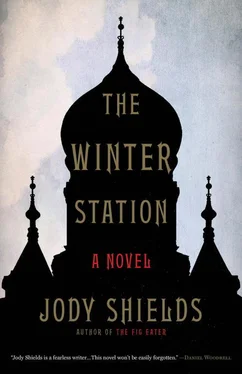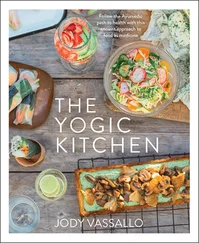Chang refused to discuss Maria Lebedev and wouldn’t mention her name. “Now leave me, Baron, so I can finish.”
At the table, koutia was served to guests. Archpriest Orchinkin bowed his head over his bowl. “This rice is the buried seed that will rise up again. The raisins, like Christians, will be reconstituted. Honey, like the Resurrection, is the sweetness of heaven.”
After the archpriest’s blessing, bottle after bottle of Russian Excelsior champagne and red wine from the Caucasus sent by General Khorvat were passed around the table. As they grew noisily drunk, guests casually loosened or removed their masks.
The Baron noticed Zabolotny and Wu standing with Messonier near the sideboard. Messonier said little, nervously turning a smudged empty vodka glass in his hand. The other two doctors didn’t cross the room to speak with the Baron and soon left the house to return to the hospital.
The Baron brought Messonier a fresh vodka. “My friend—”
Messonier interrupted. “I don’t want the burden of accepting her death. To be the taker of sympathy. Better to refuse sympathy and be alone.”
The Baron laid his hand on Messonier’s arm.
“The strangest transformation has happened. Everything in the house where I live has been replaced with identical worthless things. I saved Maria’s teacup. Her last drink with me. Now I should boil her cup or swab it with alcohol. It’s contaminated.” His face was stiff with sorrow.
The wait for Messonier to compose himself created a physical ache.
“Maria was always impatient to drink and return to work. I’d say, ‘Finish your tea slowly. Refresh yourself. Hurry only if you believe you can save a life.’” Messonier made a dismissive gesture. “Her sacrifice was useless. No one was saved.”
“We cannot tally up a life.” The Baron’s consolation stuck in his throat. “I don’t have faith to offer any comfort. The Chinese say the only certainty is change.”
Messonier’s wan smile. “I need more vodka. You? Give me your glass if you dare. I wear no gloves.”
The Baron put his empty glass in Messonier’s open hand.
* * *
All conversation took place inside. Outside, there was no direction a body could stand without encountering wind that suffocated sentences, cold that pressured lips and throat.
The Baron and Andreev slumped at a table in a chaynaya , one of the few teahouses still open. Andreev was ill at ease, disheveled, face shadowed by a huge gray fox hat, the stubble on his cheeks damp from the mask he’d just removed. He constantly wiped his nose.
“Do I seem well?” Andreev shoved up his sleeve, extended a bare arm, insisted his pulse be taken.
The Baron hesitated, noticing a fresh cut on Andreev’s arm. One of the Chinese doctors had mentioned the diagnosis in an early medical book that if the lungs were healthy, the mo would be “quiet and whispering like fallen elm pods.” If the lungs were infected, the mo would be “suspended, and one has a sensation of striking a rooster feather.” His fingertips gently pressed against Andreev’s wrist and he became lost in a jumble of signals. He kept the bewilderment from his face. Wait. There. A racing pulse. “Your pulse is rapid, but it could be nerves.” His finger against the wrist with slight pressure diagnosed the nerves. With slightly harder pressure, the viscera could be read. By increasing the pressure, the bones could be sensed. He was cautious about contact but placed his hand across Andreev’s forehead. “Your temperature is slightly elevated. It’s not a death sentence.”
“A day never passes without fear of a cough.”
“I live by those words. I’m resigned to the situation.”
Andreev changed the subject. “The rich have left the city. The money is gone. Everything shipped into Kharbin is inspected, every crate opened by a medical officer and sprayed with God knows what foul stuff. Vegetables, feathers, paper, fur, hair and skins, rags. Even coffins and earth are sprayed. The disinfectant eats gold leaf from porcelain. Tarnishes silver. Ruins everything.”
“How is your transportation business? Helping others flee the city?”
“I was running people south to Kirin, Dairen, and Mukden. The money was good. But several wagons were wrecked by a blizzard. Icebound. Lost three drivers. That’s how the trouble started.” Andreev’s words tumbled out, and his fingers nervously tore at a napkin. Perhaps he’d taken a drug. “A woman died. And her children. Wife of an official. All her trunks were lost. I’m certain she died of plague, not conditions in my vehicle. Now her husband pursues me. Unless he dies of plague first.”
“Surely your business will recover. Plague has no mercy.” The Baron kept his voice quiet, attempting to calm Andreev. “People are desperate to leave Kharbin since the price of the CER train tickets was raised, thanks to the Russians.”
“I’m in a hole. I have very little money. I can’t officially work since I have only a wolf’s passport. My creditors threatened to kill me.”
“What do you need?”
Andreev asked for a loan, named a vast sum. “I swear it will be repaid honestly. Unless there’s something you’d like to buy or order.”
The Baron whistled. “Impossible. I’ll give you money for a train ticket. You can escape.”
“Escape? How can I escape? You said I have a temperature. I’ll never get past the plague doctors at Central Station. I’ll be thrown in quarantine. You’ve always been fair with me. I don’t beg without reason. What’s the saying? What’s here today would scarcely have been believable yesterday?”
Andreev’s eyes seemed to leave a mark as they searched the Baron’s face. In self-protection, he angled his head away. “Come to the house tomorrow. I have more money there.” He laid all the money from his pockets on the table. He felt himself slowing down against the other man’s panic. Setting a distance was a way to resolve concern for others.
Agitated, Andreev stuffed the bills inside his shirt. “The city’s on the verge of collapse. It’s quicker to freeze to death than starve or die of plague. And possibly more pleasant. But tell me more about the sickness. The plague. If a sick person touches something and then you touch it, can you get infected? Is it true gloves protect the hands?”
The Baron patiently answered his questions. Probably not, and yes.
“Can you catch plague from a corpse?”
“I’m certain the bacilli die with the host body. Although some doctors disagree.”
“Once the plague corpse is buried, is the dirt around it contagious?”
“No. A body would freeze before it could decompose in the ground. But why this concern about plague? You’ve always been so reckless.” The Baron studied the other man for a clue, trying to locate the driving point behind his questions.
“I’m older. More cautious.” His grin to signal a joke between them.
Then the Baron knew. “You’re working for Dr. Wu. Taking bodies for autopsy. For experiments.”
Before Andreev turned his face away, a fleeting expression betrayed his answer.
“ Gospodi-pomiluy . God have mercy.”
Andreev’s fingers tapped the table as if the sound would silence the Baron’s words. “I’m just a carrier. Move the dead from one place to another.”
“Where do you get the bodies?”
“From the hospitals. The unclaimed corpses. Otherwise, they’d be dumped in a field. Isn’t it better the dead help the living? But now they plan to take corpses from the cemeteries. All the bodies recently buried.”
The Baron found his voice. “So they’re afraid the corpses are contagious. So they’ll dig them up.” He made a silent vow. “But the churches won’t allow it. This desecration.”
Читать дальше











